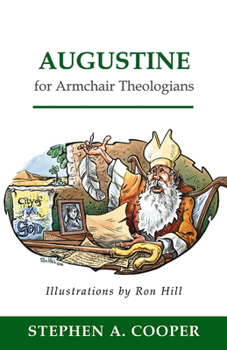Augustine for Armchair Theologians
(Part of the Armchair Theologians Series)
Select Format
Select Condition 
Book Overview
In this Book, Stephen Cooper provides an overview of one of the greatest theologians of the early church: Augustine of Hippo. Through discussing the Confessions, Cooper introduces the life and thought... This description may be from another edition of this product.
Format:Paperback
Language:English
ISBN:0664223729
ISBN13:9780664223724
Release Date:September 2002
Publisher:Westminster John Knox Press
Length:216 Pages
Weight:0.65 lbs.
Dimensions:0.7" x 5.0" x 8.1"
Customer Reviews
2 ratings
Accessible Commentary on The Confessions with Quality, but Slightly Disconcerting Illustrations
Published by Thriftbooks.com User , 17 years ago
This text is more of a chapter by chapter commentary on the confessions than an introduction to Augustine's thought in general. There is very little mention of his other great works. Cooper pretty much tells Augustine's personal story rather than produce an accessible intro to his works. But reviewing the book for what it is rather than what I thought it would be: This is an accessible commentary on the confessions that does a very good job highlighting the major themes and unpacking how Augustine theological assertions emerge from the telling of his story. He is obviously very familiar with the text and selects numerous and appropriate, poetically translated excerpts that convey a sense of Augustine's accessible and conversational style. As for the illustrations: I found them to be well done, humorous, and have used a couple of them in presentations on Augustine. This distinguishes the `Armchair Theologian' series from the `For Beginner's' series, whose illustrations are almost always disappointing. I do have one critique. The illustrator had no qualms about portraying God in flippant, somewhat irreverent cartoon form which I think Augustine (along with much of the Judea-Islamic-Christian tradition with their great discomfort regarding images of God) would be pretty uncomfortable with. I found them just a little disconcerting myself.
Sit right down...
Published by Thriftbooks.com User , 20 years ago
Stephen Cooper, associate professor of religious studies at Franklin and Marshall College in Pennsylvania, has produced a very readable and practical guide to Augustine in this text, 'Augustine for the Armchair Theologians'. At first glance, one might think that the text is not a serious text (not always a bad thing to assume, mind you), as there are line-art drawing of a cartoon-ish nature throughout, but this is no book for dummies (although it is very accessible). Cooper does not dishonour the text of Augustine's 'Confessions', instead following very closely the autobiographical portion of the 'Confessions', deviating only to bring in outside material (from Augustine or from other sources) to further enlighten the reader.Augustine remains a pivotal figure, both in church history, and history of the world generally. A man of great passion and great intellect, he combined these in fascinating ways, producing what many call the first real autobiography (in his 'Confessions') and putting together a mammoth collection of practical and philosophical theological writings, such that the scholar Isidore of Seville wrote that 'he who claims to have mastered all of Augustine is a liar'.Augustine lived at the time of the fall of Rome and the initial breakdown of Roman society, a time when the primary surviving institution was the church, and the world longed for stability of 'the good old days'. Augustine himself was a man of great passion who had in his youth no problem of acting out of that passion; he had deep, powerful relationships and a keen intellect and personality that attracted people to him. It is perhaps this social aspect, Cooper states, that is the primary aspect of Augustine, both in his relationship in the world and his desiring a relationship with a God who also desires to be in relationship.Cooper follows the first nine books (chapters) of 'Confessions' closely, and gives a brief overview of the rest of the 'Confessions', to some extent doing in some regard what he criticises others for doing - Cooper mentions that often when 'Confessions' are assigned as reading in college, only the first nine books are required. The tenth book is a remarkable piece of psychological self-study (centuries before psychological study was born), and the rest give insights into the way Augustine read scripture (a vitally important piece in understanding Augustine's overall thought development) as well as the kinds of unanswered questions that followed Augustine throughout the rest of his career.Cooper's concludes with an overview of Augustine's life as a bishop (after the death of his mother, his best friend, and his son) and some of his actions, particularly with regard to controversial issues such as the dealing with the Donatists (an officially heretical group still in vogue in northern Africa). Cooper gives some discussion of major issues and writings in Augustine's life post-'Confessions', but given the massive amount of work Augustine produced,





